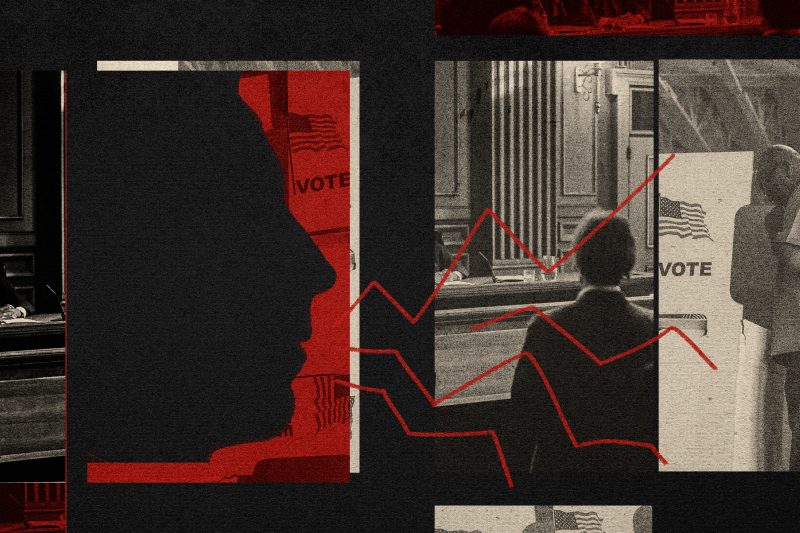PHOENIX — The election officials piled into the front row of a federal courtroom — a show of support for a local public official who has endured more than two years of attacks for his role in helping to certify Donald Trump’s loss in Arizona in 2020.
Clint Hickman’s simple act — which was required by law and his oath as chairman of the Maricopa County Board of Supervisors — resulted in hundreds of mostly anonymous threats. Hickman, a 58-year-old Republican who has served as a supervisor for a decade, says he is so tired of election denialism and hostility toward rank-and-file staff that he has not yet decided if he will run for reelection next year.
On Monday, he came face-to-face with one of his harassers.
Mark Rissi, a 65-year-old from Iowa who has worked in customer service in recent years, walked into the courtroom using a cane. He slowly passed Hickman as he made his way to the defendant’s table. In April, he pleaded guilty to sending threatening communications to Hickman and the state’s former attorney general, Mark Brnovich, also a Republican.
He was in court to receive his punishment.
The remarkable scene in the Phoenix federal courthouse this week reflected the extent to which the institutions of American politics and justice continue to grapple with the fallout of Trump’s false claims of widespread voter fraud, which swept many of his supporters into a frenzy and led to an onslaught of threats and attacks on local officials who merely did their jobs carrying out the election and then accepting the results.
Now, many of those who embraced the threat of violence or violence itself as they questioned the election results are facing federal prosecutors — and having to explain their actions and often face consequences.
Rissi came into Hickman’s life Sept. 27, 2021, nearly a year after the election and days after the conclusion of a partisan and unreliable review of 2.1 million ballots cast by Maricopa County voters affirmed Joe Biden’s win. That review garnered international attention and raised hopes among fervent Trump supporters and believers in disinformation that the former president’s loss would be reversed.
Rissi called Hickman’s office and left a voice mail.
“Hello, Mr. Hickman, I am glad that you are standing up for democracy and want to place your hand on the Bible and say that the election was honest and fair,” Rissi said, according to court records and an audio of the recording obtained by The Washington Post. “I really appreciate that.”
Rissi spoke slowly and calmly, giving the initial impression that his message was one of support. Then his voice quickly changed.
“When we come to lynch your stupid lying commie a–, you’ll remember that you lied on the f—ing Bible, you piece of s—,” Rissi angrily said. “You’re going to die, you piece of s—. We’re going to hang you. We’re going to hang you.”
Weeks later, on Dec. 8, 2021, Rissi left a message for the attorney general. Rissi said he and his family members were victims of a crime — “the theft of the 2020 election,” court records said.
“Do your job, Brnovich, or you will hang with those son-of-a-b—-es in the end,” Rissi said. “We will see to it, torches and pitchforks. That’s your future. … Do your job.”
Rissi’s attorney, Anthony James Knowles, told the judge that at the time of the calls, there was “a lot of misinformation being promulgated” by Rissi’s family and the media.
“People start believing this stuff,” Knowles said. “Again, not a justification.”
At the sentencing hearing this week, Rissi stood when it was his turn to speak — and he expressed remorse.
“First, I’d like to offer my apologies to the victims,” he said.
Amid his mom’s time in hospice during the coronavirus pandemic, Rissi said he had spent hours listening to his brother “ranting and raving” about allegations of election improprieties in Arizona. In the months after her death, Rissi said he was taking medication for his own ailments that he says altered his behavior. His voice cracking, he recounted how his wife had told him one day that he had called someone the night before and was screaming into a phone. Rissi said he didn’t know what he’d done until the FBI showed up at his door.
“It was horrifying,” he recalled of his reaction to hearing his voice mail to Hickman.
“I did this,” he said. “It’s my fault. I accept responsibility. And I’m deeply sorry.”
Hickman later said in an interview that Rissi’s explanation was unexpected. Stepping to a microphone, Hickman asked that Rissi’s voice mails be read into the court record.
Rissi looked down and listened to his words. He shook his head and pursed his lips as a prosecutor read the word “lynch.”
Brnovich did not attend the hearing and sent a statement to be read on his behalf.
The former attorney general gave momentum to falsehoods about the election by dedicating resources to investigating them. The prosecutor’s probes helped legitimize the false claims for many Trump supporters, but they eventually soured on him, saying he did too little to help provide sufficient evidence of wrongdoing during the election. Brnovich wrote in the statement that harassment against his family continues.
He asked the judge to impose a sentence that would discourage others from threatening election workers and public officials.
Then it was Hickman’s turn to address the judge. The egg farmer said it was his first time in a courtroom. He said he was grateful for the support of “three gentlemen that have had death threats against them,” too. All three attended the hearing.
Behind him sat Tom Liddy, a fellow Republican and deputy county attorney who helps represent the county on election cases. The son of G. Gordon Liddy, the lawyer who devised the botched burglary that led to the Watergate scandal and the resignation of President Richard M. Nixon, Tom Liddy was fresh off a road trip to Texas, where he had read his own victim statement in court proceedings involving a different man who threatened him and his family after Republican losses in the 2022 election.
There was the county recorder, Stephen Richer, another Republican who was also targeted by the Texas man and penned an impact statement for those proceedings. Next to him sat Bill Gates, a Republican county supervisor and victim of similar threats and harassment who has decided to not run for reelection next year.
Also in the courtroom was Andy Kunasek, a former Republican supervisor who told The Post that the last time he had attended a sentencing was for the man who shot a Democratic county supervisor in 1997 for her support of a tax that funded a new baseball stadium.
“This case is about the bullets that are words,” Hickman said. “My family has lived through almost a nightmare. ”
He recalled events that have upended their lives since the 2020 election. In the days afterward, he had readied his teenage sons to help law enforcement officers in case they were overrun by the 100 or so Trump supporters who protested outside of their home in a suburb west of Phoenix.
“We’d like it to stop,” Hickman said of hostility toward elected officials and government workers. “I’m fatigued. That’s basically where a lot of us are finding ourselves with public service.” He said his family has carried him through three difficult years, and he hoped Rissi “gets back to his family as quickly as he can.”
He asked the judge to show Rissi “grace, humility, charity” and compassion.
Instead, U.S. District Judge Dominic Lanza, a Trump nominee, showed Rissi a severe sentence.
Lanza issued a sentence of 30 months — six months more than requested by the Justice Department, drawing audible gasps in the courtroom.
The judge said he hoped the punishment would deter those dissatisfied by future election outcomes, showing that there is an “unambiguous and serious line” that cannot be crossed when contacting public officials. He echoed concerns voiced by a prosecutor about an alarming exodus of government election workers amid a hostile and threatening environment. He said a “general deterrence” was “extremely important.”
“This cuts to the core of how our democracy works,” Lanza said.
The judge appeared sympathetic to Rissi but noted that the Iowan had made two threatening calls separated by several weeks. He gave Rissi until Jan. 8 to report to federal authorities, allowing him to spend the holidays with his loved ones, some of whom sat behind him throughout the proceedings.
“I believe,” the judge said, “I am acting with compassion.”








